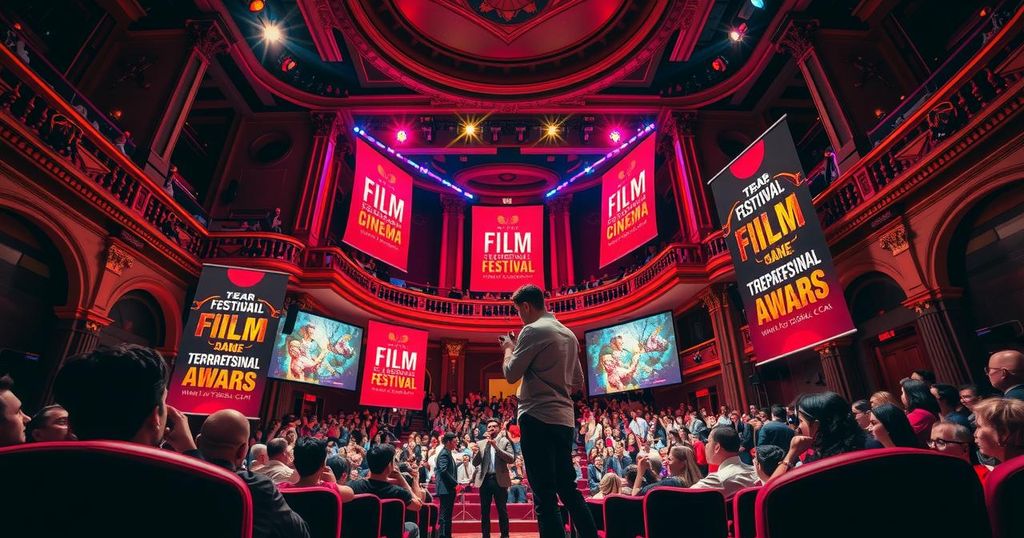Kyrgyzstan’s ‘Black Red Yellow’ Wins Best Picture at Expanded 2025 Shanghai Film Festival

The 27th Shanghai International Film Festival awarded Kyrgyz film *Black Red Yellow* Best Picture, with notable wins for *On Summer Sand* and *Wild Nights, Tamed Beasts*. Jose Martins won Best Actor, while significant trends like AI in film were featured prominently. The festival expanded its reach, screening 400 films across multiple cities, fostering greater audience connection.
The 27th Shanghai International Film Festival came to a close amid shining lights and accolades, honoring a rich array of global talent. This year’s Golden Goblet awards saw winners from distant locations like Kyrgyzstan and Portugal collect their honors at the grand Shanghai Grand Theatre. Jury president Giuseppe Tornatore, known for his Oscar-winning film Cinema Paradiso, praised the distinguished mix of films, calling them “unique and magnificent.”
Kyrgyz filmmaker Aktan Arym Kubat took home the top prize for his film Black Red Yellow, which who the jury said offered a deep look at rural life and marriage. This poignant piece was hailed for capturing the essence of existence itself. Meanwhile, the Jury Grand Prix was awarded to two films: On Summer Sand from Japan, directed by Shinya Tamada, and Wild Nights, Tamed Beasts from China, helmed by Wang Tong, whose exciting debut earned accolades as a notable voice in the industry.
Veteran actor Jose Martins from Portugal won best actor for his role in The Scent of Things Remembered, a powerful portrayal of racial struggles shaped by past wars. His gripping performance drew significant attention, echoing Tornatore’s confidence in the jury’s choices. The festival also featured packed screenings, with some films selling out within the first hour, underscoring a vibrant interest in cinematic arts.
Back home, local filmmakers shone brightly. Veteran Cao Baoping clinched best director honors for his comedy One Wacky Summer, while rising star Qiu Sheng was awarded the artistic achievement prize for his AI-themed drama, My Father’s Son. In the Asia New Talent category, newcomer Bian Zhou won accolades for his historical epic As the Water Flows, endearing itself to local critics.
European filmmaking made its mark too, with Germany fielding intriguing entries. Two noteworthy films made waves in the main competition: Luisa by Julia Roesler, a heartfelt story about disability, and You Believe in Angels, Mr Drowak? by Nicolas Steiner—a stylish, surreal comedy. Four sub-category films from Germany also sparked chatter among festival-goers.
AI’s expanding role in cinema couldn’t be overlooked during the festival. Opening night featured a stunning montage merging AI-generated visuals with classics, while the “Kung Fu Movie Heritage Project: 100 Classics AI Revitalization” highlighted the aim of rejuvenating iconic films using AI. “We hope to promote a new Chinese action film and television ecology with the characteristics of the times,” said Hu Min, director of the China Film Foundation, underlining China’s progressive stance on AI in film technology.
This year’s festival was marked by an ambitious goal to broaden its reach across Shanghai, a city sprawling over 2,448 square miles and home to about 25 million people. Around 400 films were screened in 40 theaters, with screenings expanded to nearby cities like Hangzhou and Nanjing. In a unique twist, attendees could exchange ticket stubs for various rewards, from limited edition cups to discounted meals.
To further engage audiences, the festival ramped up visits from filmmakers. Notably, Peter Chan made rounds to six screenings of his opening film She’s Got No Name, coinciding with a simultaneous release in 120 additional theaters. “When cinema in China started, Shanghai was the hub… that’s what’s happening again,” said Chan, encapsulating the rejuvenated excitement surrounding Shanghai’s cinematic landscape.
The 27th Shanghai International Film Festival showcased a dynamic lineup of global cinema, highlighting diverse perspectives from countries such as Kyrgyzstan, Japan, and China, while celebrating local talent. The event demonstrated significant advancements in film technology, particularly AI, signaling a vibrant future for the industry. As the festival expands its outreach across Shanghai and its neighboring cities, it embraces a renewed spirit of connection with audiences, reaffirming its status as a major hub for cinematic exploration.
Original Source: www.hollywoodreporter.com






